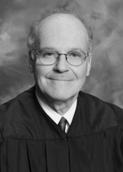 After you have read the Washington State Supreme Court decision and dissents on same-sex marriage, you are likely to drag out your clichés. What planet are these justices from and is this mental disease contagious to other courts?
After you have read the Washington State Supreme Court decision and dissents on same-sex marriage, you are likely to drag out your clichés. What planet are these justices from and is this mental disease contagious to other courts?In a huge surprise, you can listen to that court's chief justice being interviewed by -- ta da -- Dan Savage. The comments support the view circulating widely that state high courts are pretty gutless and that the bold pro-civil-rights decisions like Goodridge are rare indeed.
Those who know Savage as that sex columnist only should be aware that he runs the Seattle alternative weekly, The Stranger. He and his long-term partner are adoptive parents of son DJ. He is thoroughly invested in politics, in gay rights, in news, and marriage equality.
Chief Justice Gerry L. Alexander is not a crackpot conservative, nor is he the famous cricket player of that name. What he is seems to illustrate the current state and near-term future of civil-rights court decisions.
He and his court help prove that the right-wing slur of activist judge is as much a sham as liberal media. Both courts and mainstream media are geldings. They occasionally kick, but mostly hang around the trough. We have also seen that here in Massachusetts with the dreadfully cowardly non-resolutions of the 1913 race-based marriage laws and the anti-SSM amendment petition blessing.
Savage has reduced an hour interview into an on-line exclusive set of links to MP3 files with cue sheets. The under-10-minute segments concentrate on SSM-related issues. Section one talks about the decision, specifically about five minutes in, the suspect class issue. Section two deals more with the byzantine reasoning in the mush-mouthed decision.
The entire question of suspect class arose in the New York version of this question. The Olympia decision -- and the blistering dissents -- suggest the current court state. Basically, the Washington majority avoided the underlying issue two ways.
First, it pre-decided the issue by narrowing the case to the slimmest legal issue possible. The five judges wanted to decide only whether the state legislature might have reasonably thought they had a basis for the DOMA law. This basically removes the constitutional issues and conflicts with equal-rights laws and decisions.
With this in mind, they likewise said that the jive about it being possible that kids would do better in opposite-sex-parent families was a fair assumption by the legislature. Even with a mountain of evidence suggesting otherwise, they said that if there was a difference of opinion, the lawmakers could go to any point of view and just pick it.
Second, they did something similar to suspect class, that is a group that has a history of discrimination through no fault of its own. This works for race, for example, but not something optional like religion, which in turn has its own protections.
Instead, the justices put the burden on the plaintiffs to show that homosexuals were a suspect class in Washington. That was not the suits' main purpose. No one disputes that homosexuals are punished by individuals and under law. However, the Washington Five decided that the plaintiffs did not prove what they had not set out to prove, that homosexuality is an immutable characteristic.
Very oddly, in the interview, Alexander said he thinks it's likely people are born gay, just that this was not proven.
Before you listen, you may well wonder what a sitting justice, particularly the court's chief justice, was doing commenting on this steaming fresh case. It turns out that the interview was part of a larger one of the three justices who are up for election shortly. Alexander did not cancel in light of the decision and the vague possibility of reconsideration.
He regretted that several times during the interview.
As teasers, consider:
- When asked about the suspect class issue, he said that the plaintiffs did not prove this. Yet, "I suppose the preponderance of the evidence is that it's an immutable characteristic, but I don't claim to be an expert."
- When asked whether the plaintiffs made a mistake in not bringing up evidence of the inborn nature of homosexuality, "You'd have to ask them."
Tags: massmarrier, same sex marriage, Washington State, Gerry Alexander, Dan Savage
No comments:
Post a Comment